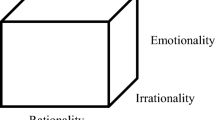Abstract
This paper discusses the issue of how to use fuzzy targets in the target-based model for decision making under uncertainty. After introducing a target-based interpretation of the expected value on which it is shown that this model implicitly assumes a neutral behavior on attitude about the target, we examine the issue of using fuzzy targets considering different attitudes about the target selection of the decision maker. We also discuss the problem for situations on which the decision maker’s attitude about target may change according to different states of nature. Especially, it is shown that the target-based approach can provide an unified way for solving the problem of fuzzy decision making with uncertainty about the state of nature and imprecision about payoffs. Several numerical examples are given for illustration of the discussed issues.
Similar content being viewed by others
Explore related subjects
Discover the latest articles, news and stories from top researchers in related subjects.References
Abbas A.E., Matheson J.E. (2005). Normative target-based decision making. Managerial and Decision Economics 26: 373–385
Abbas, A. E., & Matheson, J. E. (2004). Utility-probability duality. Submitted for Publication 2004 (Available at http://arxiv.org/abs/cs.AI/0311004).
Bordley R., LiCalzi M. (2000). Decision analysis using targets instead of utility functions. Decisions in Economics and Finance 23(1): 53–74
Bordley R. (2003). Reformulating decision theory using fuzzy set theory and Shafer’s theory of evidence. Fuzzy Sets and Systems 139, 243–266
Bordley, R. (2002). Foundations of target-based decision theory. In U. Derigs (Ed.), Optimization and operations research, from Encyclopedia of Life Support Systems (EOLSS), Developed under the Auspices of the UNESCO. Oxford, UK: Eolss Publishers [http://www.eolss.net].
Bordley R., Kirkwood C. (2004). Multiattribute preference analysis with performance targets. Operations Research 52(6): 823–835
Brachinger, H. W., & Monney, P.-A. (2002). Decision analysis. In U. Derigs (Ed.), Optimization and operations research, from Encyclopedia of Life Support Systems (EOLSS), Developed under the Auspices of the UNESCO. Oxford, UK: Eolss Publishers [http://www.eolss.net].
Castagnoli E., LiCalzi M. (1996). Expected utility without utility. Theory and Decision 41(3): 281–301
Castagnoli E., LiCalzi M. (2006). Benchmarking real-valued acts. Games and Economic Behavior 57(2): 236–253
Chankong V., Haimes Y.Y. (1983). Multiobjective decision making: theory and methodology. New York, Elsevier Science B.V.
Huynh V. N., Nakamori Y. (2005). A satisfactory-oriented approach to multi-expert decision-making under linguistic assessments. IEEE Transactions on Systems, Man, and Cybernetics–Part B 35(2): 184–196
Huynh, V. N., Nakamori, Y., Ryoke, M., & Ho, T. B. (2006). A fuzzy target based model for decision making under uncertainty. In Proceedings of IEEE International Conference on Fuzzy Systems, Vancouver, Canada, July 2006, pp. 1611–1618.
Kahneman D., Tversky A. (1979). Prospect theory: An analysis of decision under risk. Econometrica 47(2): 263–291
Lee K.M., Cho C.H., Lee-Kwang H. (1994). Ranking fuzzy values with satisfaction function. Fuzzy Sets and Systems 64, 295–309
Lee-Kwang H., Lee J.-H. (1999). A method for ranking fuzzy numbers and its application to decision-making. IEEE Transactions on Fuzzy Systems 7(6), 677–685
LiCalzi M. (1999). A language for the construction of preferences under uncertainty. Revista de la Real Academia de Ciencias Exactas, Fìsicas y Naturales 93, 439–450
Liu X. (2004). On the methods of decision making under uncertainty with probability information. International Journal of Intelligent Systems 19, 1217–1238
Manski C.F. (1998). Ordinal utility models of decision making under uncertainty. Theory and Decision 25, 79–104
Rommelfanger, H. J. (2002). Fuzzy decision theory. In U. Derigs (Ed.), Optimization and operations research, from Encyclopedia of Life Support Systems (EOLSS), Developed under the Auspices of the UNESCO, Oxford, UK: Eolss Publishers [http://www.eolss.net].
Samson D. (1988). Managerial decision analysis. Chicago, Irwin Publishing Co.
Savage L.J. (1954). The foundations of statistics. New York, John Wiley and Sons
Simon H.A. (1955). A behavioral model of rational choice. The Quarterly Journal of Economics 69, 99–118
Von Neumann J., Morgenstern O. (1944). Theory of games and economic behavior. Princeton University Press, Princeton
Yager R.R., Filev D.P. (1994). Essentials of fuzzy modeling and control. New York, Wiley
Yager R.R. (1999). Including decision attitude in probabilistic decision making. International Journal of Approximate Reasoning 21, 1–21
Yager R.R. (1988). On ordered weighted averaging aggregation operators in multicriteria decision making. IEEE Transactions on Systems, Man, and Cybernetics 18, 183–190
Yager R.R. (2000). Fuzzy modeling for intelligent decision making under uncertainty. IEEE Transactions on Systems, Man, and Cybernetics–Part B 30(1): 60–70
Yager R.R., Detyniecki M., Bouchon-Meunier B. (2001). A context-dependent method for ordering fuzzy numbers using probabilities. Information Sciences 138(1–4): 237–255
Yager R.R. (2002a). On the instantiation of possibility distributions. Fuzzy Sets and Systems 128(2): 261–266
Yager R.R. (2002b). On the valuation of alternatives for decision-making under uncertainty. International Journal of Intelligent Systems 17, 687–707
Yager R.R. (2004). OWA aggregation over a continous interval argument with applications to decision making. IEEE Transactions on Systems, Man, and Cybernetics–Part B 34(5): 1952–1963
Zadeh L.A. (1965). Fuzzy sets. Information and Control 8, 338–353
Zadeh L.A. (1978). Fuzzy sets as a basic for a theory of possibility. Fuzzy Sets and Systems 1, 3–28
Author information
Authors and Affiliations
Corresponding author
Rights and permissions
About this article
Cite this article
Huynh, VN., Nakamori, Y., Ryoke, M. et al. Decision making under uncertainty with fuzzy targets. Fuzzy Optim Decis Making 6, 255–278 (2007). https://doi.org/10.1007/s10700-007-9011-0
Published:
Issue Date:
DOI: https://doi.org/10.1007/s10700-007-9011-0




